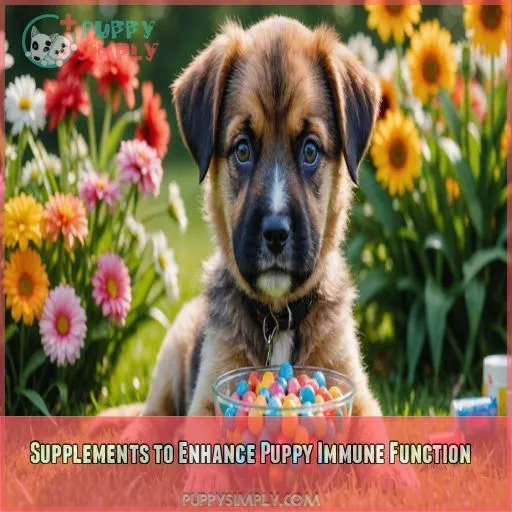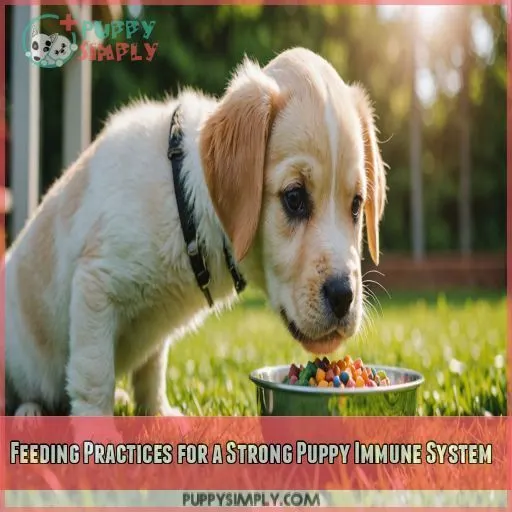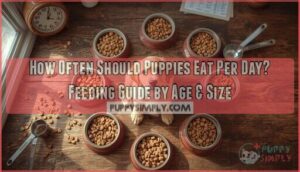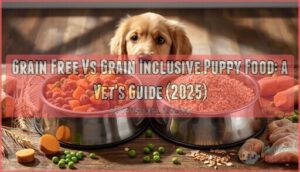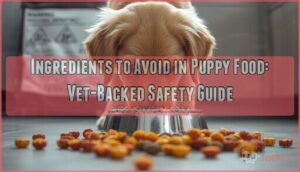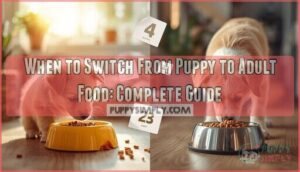This site is supported by our readers. We may earn a commission, at no cost to you, if you purchase through links.

Feeding your pup the right food for immune system health is key.
You’ll want to focus on nutrient-rich ingredients like lean meats, fish, and eggs for protein, along with colorful fruits and veggies packed with vitamins and antioxidants.
Don’t forget about omega-3 fatty acids; they’re like a superhero cape for your puppy’s immune defenses!
Probiotics are another secret weapon, keeping your pup’s gut happy and healthy.
By choosing the right puppy food for immune system support, you’re not just filling their bowl; you’re building a fortress of health.
And trust us, there’s more to this tail-wagging tale of nutrition than meets the eye!
Table Of Contents
- Key Takeaways
- Essential Nutrients for Puppy Immune System Development
- Superfoods to Boost Your Puppy’s Immunity
- Balanced Diet Strategies for Optimal Puppy Immunity
- Supplements to Enhance Puppy Immune Function
- Feeding Practices for a Strong Puppy Immune System
- Special Dietary Considerations for Immunocompromised Puppies
- Lifestyle Factors Supporting Puppy Immune Health
- Frequently Asked Questions (FAQs)
- What can I give my puppy for immune support?
- Do puppies have strong immune systems?
- What food is good for weak immune system?
- Does living with a dog help immune system?
- How does puppy breed affect immune system requirements?
- Can overfeeding impact a puppys immune health?
- Are raw diets beneficial for puppy immunity?
- How do vaccinations interact with puppy immune development?
- What role does hydration play in puppy immunity?
- Conclusion
Key Takeaways
- You’ll want to focus on nutrient-rich ingredients like lean meats, fish, and colorful fruits and veggies to boost your pup’s immune defenses. Think of it as building a fortress of health, one tasty bite at a time!
- Don’t forget about omega-3 fatty acids—they’re like a superhero cape for your puppy’s immune system. You can find them in fish oil supplements or foods like salmon, which will have your furry friend’s tail wagging in no time.
- Probiotics are your pup’s gut-health superheroes, supporting both digestive and immune function. You’ll want to introduce these beneficial bacteria early on, either through supplements or fortified foods, to keep your puppy’s tummy happy and healthy.
- Remember, it’s not just about what’s on the plate—lifestyle factors like regular exercise, stress reduction, and proper vaccination schedules play a crucial role in your pup’s immune health. Think of it as a holistic approach to raising a healthy, tail-wagging companion!
Essential Nutrients for Puppy Immune System Development
You’re about to become a puppy nutrition expert, ready to supercharge your furry friend’s immune system. Let’s explore the essential nutrients that’ll turn your pup into a healthy, tail-wagging powerhouse.
Vitamin-rich Foods for Puppies
As your puppy grows, feeding them vitamin-rich foods is like giving their immune system a supercharged boost.
Skip the citrus and opt for puppy-friendly alternatives like red bell peppers, packed with vitamin C.
Leafy greens and colorful veggies are nature’s multivitamins for your furry friend.
Don’t forget vitamin-packed fruits like blueberries; they’re like tiny antioxidant bombs for your pup’s health.
Fortified puppy treats can also be a tasty way to sneak in extra nutrients.
Protein Sources for Immune Function
Regarding your pup’s immune system, protein is the superhero of nutrients. It’s the building block for those tiny crime-fighting cells that keep your furry friend healthy.
Lean meats like chicken, turkey, and fish are excellent choices. But don’t forget about eggs – they’re a protein powerhouse!
Just remember, quality matters more than quantity. A balanced diet with high-quality protein sources will have your pup feeling their best.
Omega-3 Fatty Acids and Immune Health
While protein’s the foundation, omega-3 fatty acids are the secret sauce for your pup’s immune health. These powerhouse nutrients pack a punch, boosting your furry friend’s defenses like a tiny army. Here’s what omega-3s can do for your puppy:
- Reduce inflammation faster than you can say "fetch"
- Support brain development (hello, smarty-paws!)
- Promote a shiny coat that’ll make other dogs green with envy
- Enhance heart health for those energetic play sessions
- Improve joint function for all those zoomies
Zinc-rich Foods for Puppy Immunity
Zinc is a superstar for your puppy’s immune system.
It’s like a tiny shield, protecting your furry friend from invaders.
You’ll find this mighty mineral in foods like lean meats, eggs, and seafood.
Don’t let your pup become a zinc zombie – make sure their diet includes these powerhouse ingredients.
Probiotics and Gut Microbiome Support
Probiotics are like tiny superheroes for your pup’s gut, supporting a healthy microbiome.
They’re a game-changer for your puppy’s immune system.
You’ll want to introduce these beneficial bacteria early on, as they play a key role in digestion and immunity.
Look for puppy-specific probiotic supplements or foods fortified with them.
Superfoods to Boost Your Puppy’s Immunity
You’re about to discover some amazing superfoods that can give your puppy’s immune system a serious boost. From antioxidant-packed fruits to powerful veggies and even some surprising ingredients like bone broth and medicinal mushrooms, these nutrient-rich foods will help your furry friend grow up strong and healthy.
Antioxidant-rich Fruits for Puppies
Fruits are nature’s candy for your pup’s immune system. You’ll want to introduce these antioxidant powerhouses to boost your furry friend’s health. Here’s a quick list of puppy-approved fruits:
- Blueberries: Packed with vitamin C and immune-boosting compounds
- Strawberries: Rich in fiber and antioxidants
- Apples: Great source of vitamins A and C (remove seeds and core)
- Watermelon: Hydrating and full of lycopene (seedless, please!)
Immune-boosting Vegetables for Young Dogs
While puppies might turn their noses up at veggies, these green goodies are immune-boosting powerhouses.
Broccoli is a superstar, packed with vitamins that support your pup’s natural killer cells.
Kale is another winner, loaded with antioxidants.
Try adding finely chopped veggies to your puppy’s food as tasty toppers.
Fresh is best, but steamed veggies are easier to digest for your furry friend.
Bone Broth Benefits for Puppy Health
While veggies pack a punch, let’s not forget the power of bone broth for your pup’s health.
This liquid gold isn’t just tasty; it’s a superfood that supports joint health, digestion, and immune function.
As your furry friend grows, bone broth can be a secret weapon in their diet.
It’s like a warm hug for their GI tract, helping them stay strong and ready for all their puppy adventures.
Medicinal Mushrooms for Canine Immunity
While bone broth packs a punch, medicinal mushrooms are the unsung heroes of canine immunity.
These fungi aren’t your average supermarket varieties.
Turkey tail and maitake mushrooms are top dogs in boosting your pup’s defenses.
Research shows they can enhance immune cell function and reduce inflammation.
But don’t go foraging just yet!
Stick to vet-approved supplements for safe dosage.
Turmeric and Its Immune-modulating Properties
Moving from mushrooms to a golden spice, let’s talk about turmeric. This vibrant yellow powerhouse isn’t just for curry – it’s a puppy health superhero! Turmeric’s active compound, curcumin, packs a punch for your pup’s immune system. Here’s why you’ll want to sprinkle some sunshine into your furry friend’s bowl:
- Fights inflammation like a tiny, tasty firefighter
- Boosts antioxidant levels, giving free radicals the boot
- Supports digestive health, keeping tummy troubles at bay
- Enhances brain function – smart pup alert!
- May help prevent certain cancers in dogs
Balanced Diet Strategies for Optimal Puppy Immunity
You’re in for a treat with these seven supercharged recipes designed to boost your puppy’s immune system. These balanced diet strategies will help your furry friend grow strong and healthy, while making mealtime a tail-wagging experience.
Puppy-specific Commercial Food Options
While superfoods pack a punch, let’s talk about ready-made options that’ll keep your pup’s tail wagging.
Commercial puppy foods are like a one-stop shop for your furry friend’s immune system.
They’re packed with all the good stuff – think of them as a balanced breakfast, lunch, and dinner rolled into one.
But not all kibble is created equal.
Let’s sniff out the best choices for your growing pup.
Homemade Puppy Food Recipes for Immunity
While commercial puppy foods are convenient, homemade recipes can be a great way to boost your pup’s immunity.
You’ll have full control over the ingredients, ensuring your furry friend gets the best nutrition.
Let’s whip up some immune-boosting meals!
Here are some simple, tasty recipes to try:
Feeding Frequency and Portion Control
Mastering your puppy’s feeding schedule is really important for their immune health.
You’ll want to stick to a consistent routine, offering meals 3-4 times daily for young pups.
As they grow, gradually reduce to 2-3 meals.
Keep portion sizes in check to avoid overfeeding – your pup’s waistline should be visible but not pronounced.
Transitioning to Adult Dog Food
Switching to adult dog food is a big step for your pup.
Timing is key.
Most breeds are ready around 12 months, but larger dogs may need to wait until 18-24 months.
Start the switch gradually.
Mix in the new food over 7-10 days.
Keep an eye out for any tummy troubles or weight changes.
Avoiding Harmful Foods for Puppies
As your puppy grows, it’s important to keep harmful foods out of reach. You’ll want to avoid chocolate, onions, garlic, grapes, and dairy products, which can wreak havoc on your pup’s developing immune system.
Think of these foods as kryptonite for your little superhero-in-training. By steering clear of these culprits, you’re setting the stage for a lifetime of tail-wagging health.
Supplements to Enhance Puppy Immune Function
You’ve got the basics covered with a balanced diet, but what if your pup needs an extra immune boost? Let’s explore some safe and effective supplements that can give your puppy’s immune system the supercharge it needs to stay healthy and strong.
Vitamin C Supplementation for Puppies
Boost your pup’s defenses with vitamin C!
While dogs naturally produce this immune-boosting superstar, supplementation can give them an extra edge.
But hold your horses – dosage is key.
Too much can upset their tummy, so stick to vet-approved amounts.
Natural sources like red bell peppers pack a punch, but supplements offer precise control.
Probiotics for Digestive and Immune Health
Probiotics are your puppy’s gut-health superheroes, bursting with beneficial bacteria.
These tiny allies support digestive and immune function by balancing the gut microbiome.
From Lactobacillus to Bifidobacterium, different probiotic strains offer unique benefits.
Think of them as your pup’s internal peacekeepers, keeping harmful bacteria at bay.
Unlike prebiotics, which feed good bacteria, probiotics introduce live cultures directly.
Your veterinarian can recommend the best probiotic supplement suited to your furry friend’s needs.
Fish Oil Supplements for Puppies
Fish oil supplements can work wonders for your puppy’s immune system. They’re packed with omega-3 fatty acids, which are like superheroes for your pup’s health. Here’s why you’ll want to add them to your furry friend’s diet:
- Boost brain development and cognitive function
- Reduce inflammation and support joint health
- Promote a shiny, healthy coat
- Help manage allergies and skin conditions
Multivitamins Designed for Growing Dogs
Just like a growing tree needs the right nutrients, your pup’s developing immune system craves a balanced diet.
Multivitamins designed for growing dogs can fill nutritional gaps, but they’re not a one-size-fits-all solution.
Look for formulas made specifically for your puppy’s growth stage, containing essential ingredients like vitamins A, D, and E.
Always follow dosage guidelines and consult your vet before starting any supplement regimen.
Herbal Immune Boosters for Puppies
Looking to boost your pup’s immune system naturally? Herbal supplements might be just what the doctor ordered.
Echinacea benefits include supporting white blood cell production, while Astragalus root can help fend off pesky infections.
The garlic controversy rages on, but elderberry extract packs a powerful antioxidant punch.
Don’t forget ginger—it’s not just for upset tummies!
Always consult your vet before adding any new supplement to your furry friend’s diet.
Feeding Practices for a Strong Puppy Immune System
You’ve got the perfect puppy food, but how you serve it matters just as much for your furry friend’s immune health. From keeping bowls squeaky clean to nailing that feeding schedule, let’s explore the simple yet important practices that’ll give your pup’s immune system a real boost.
Proper Food Storage and Handling
While supplements can boost your pup’s immunity, proper food storage is the unsung hero of their health. Think of it as puppy-proofing your kitchen!
Keep that kibble in airtight containers to fend off moisture and pesky critters.
Wet food? Pop it in the fridge after opening, but don’t let it overstay its welcome.
Clean Feeding Utensils and Bowls
Now that you’ve got your pup’s food stored properly, let’s talk about keeping those feeding bowls squeaky clean. It’s like giving your puppy’s immune system a little high-five every mealtime. Here’s why it matters:
- Bacteria love to party in dirty bowls, and your pup’s not invited to that shindig
- Clean bowls = happy tummies and fewer vet visits
- Proper cleaning keeps those pesky food particles from becoming germ condos
Dishwashing is your bestie here. Use hot, soapy water and scrub like you’re polishing a trophy.
Fresh Water Availability and Importance
Three key factors influence your puppy’s water intake: quality, accessibility, and cleanliness. Providing fresh, clean water isn’t just a nice-to-have; it’s essential for your pup’s immune system. Think of water as the superhero sidekick to your puppy’s diet, flushing out toxins and keeping everything running smoothly.
| Water Factor | Why It Matters | How to Achieve It | Monitoring Tip |
|---|---|---|---|
| Quality | Prevents contaminants | Use filtered water | Check for clarity |
| Accessibility | Encourages drinking | Multiple water stations | Observe drinking habits |
| Cleanliness | Reduces bacteria | Clean bowls daily | Look for slime buildup |
| Freshness | Maintains appeal | Change water regularly | Note water level changes |
Avoiding Overfeeding and Obesity
Don’t let your pup’s appetite run away with you! Overfeeding can lead to obesity, which puts a strain on their developing immune system. To keep your furry friend in tip-top shape:
- Measure portions accurately
- Adjust calories based on growth and activity level
- Limit treats to 10% of daily calorie intake
- Incorporate exercise into your daily routine
Consistent Feeding Schedules for Puppies
While avoiding overfeeding is key, setting a consistent feeding schedule is equally important. Your pup’s immune system thrives on routine, just like a finely-tuned orchestra. Here’s a handy guide to keep your furry maestro’s meals on tempo:
| Age (months) | Meals per day | Best times | Quantity | Schedule changes |
|---|---|---|---|---|
| 2-3 | 4 | 7am, 12pm, 5pm, 10pm | Small portions | Gradual |
| 4-6 | 3 | 7am, 2pm, 9pm | Moderate portions | Every 2-3 weeks |
| 6-12 | 2 | 8am, 6pm | Larger portions | Monthly |
Special Dietary Considerations for Immunocompromised Puppies
If your puppy has a compromised immune system, you’ll need to pay extra attention to their diet. Let’s explore some special dietary considerations that can help support your furry friend’s health and boost their immune defenses.
Hypoallergenic Food Options for Sensitive Puppies
Now, let’s talk about sensitive pups who need extra TLC. If your furry friend’s tummy’s acting up, hypoallergenic food might be the answer. Here’s what you need to know:
- Common Puppy Allergies: Beef, chicken, dairy, and wheat often top the list.
- Ingredient Labels: Become a detective – scrutinize those labels!
- Homemade Recipes: DIY meals can be a game-changer for allergic pups.
- Vet Recommendations: Your vet’s your best ally in this food adventure.
Low-fat Diets for Specific Health Conditions
In some cases, your pup might need a low-fat diet to keep their tail wagging.
If your furry friend is dealing with pancreatitis, kidney issues, or needs to shed a few pounds, a lean menu can be just what the vet ordered.
These diets aren’t just about cutting calories; they’re designed to support your pup’s specific health needs while keeping their immune system in top shape.
Limited Ingredient Diets for Allergies
Many puppies with allergies benefit from limited ingredient diets, which can be a real game-changer.
These diets typically contain one protein source and one carbohydrate, making it easier to identify and avoid common allergens.
You’ll want to keep an eye out for signs of allergies, like itching or digestive issues.
When you’re switching to a new diet, take it slow to avoid upsetting your pup’s tummy.
DIY recipes can be tempting, but consult your vet first for long-term health effects.
Prescription Diets for Immune-related Issues
While limited ingredient diets can help with allergies, some puppies need more targeted nutrition. If your pup’s immune system is struggling, your vet might recommend a prescription diet. These specialized foods are like a superhero suit for your puppy’s immune system, designed to tackle specific health issues head-on.
Here’s what you need to know about prescription diets for immune-related issues:
- They’re formulated to address common immune problems
- Often contain higher levels of antioxidants and omega-3s
- May include novel proteins to reduce allergic reactions
- Can be pricier than regular puppy food
- Require a veterinary prescription to purchase
Consulting With a Veterinary Nutritionist
Often, when dealing with immunocompromised puppies, you’ll need expert guidance. A veterinary nutritionist can be your secret weapon in crafting the perfect diet. They’ll analyze your pup’s unique needs, considering factors like:
| Consideration | Impact | Recommendation |
|---|---|---|
| Food Allergies | Immune stress | Elimination diet |
| Nutritional Gaps | Weakened defenses | Targeted supplements |
| Commercial Foods | Quality concerns | Brand analysis |
| Homemade Diets | Balance issues | Recipe formulation |
| Feeding Schedule | Digestive health | Customized plan |
Think of them as your puppy’s personal chef and health coach rolled into one!
Lifestyle Factors Supporting Puppy Immune Health
Your puppy’s immune health isn’t just about what’s on their plate. Everyday lifestyle choices, from playtime to vet visits, play a big role in keeping your furry friend’s defenses strong and ready to tackle whatever comes their way.
Exercise and Its Impact on Immunity
While a customized diet is important for immunocompromised pups, don’t forget the power of playtime!
Exercise isn’t just about burning energy; it’s a secret weapon for your puppy’s immune system.
Regular walkies and fetch sessions can boost antioxidants, improve circulation, and keep your furry friend at a healthy weight.
Plus, it’s a great way to bond and create tail-wagging memories together.
Stress Reduction Techniques for Puppies
- Give your pup a gentle massage to melt away tension
- Play soothing tunes to create a peaceful atmosphere
- Use calming scents like lavender for aromatherapy bliss
Don’t forget to provide plenty of chew toys and create a cozy safe space for your little one to retreat when life gets ruff!
Proper Vaccination Schedules and Immunity
Vaccines are your pup’s shield against disease.
Your furry friend’s immune system is like a castle under construction, and core vaccines are the cornerstone.
Timing is key – too early, and they might not take; too late, and your pup is at risk.
Don’t forget those booster shots!
While mild side effects can occur, they are a small price for your pup’s long-term health.
Environmental Factors Affecting Puppy Health
Beyond the needle, your pup’s health is shaped by their surroundings.
Your home’s air quality can make or break their immune system.
Keep it fresh and clean!
Don’t let parasites crash the party – they’re uninvited guests that can wreak havoc.
Stress? It’s not just a human problem.
Create a zen den for your furry friend.
A happy pup is a healthy pup, so make sure their living space is a tail-wagging paradise!
Regular Veterinary Check-ups and Screenings
Regular vet check-ups are your puppy’s ticket to a healthy life.
Don’t skip these important appointments!
Your vet will keep your pup’s vaccinations up-to-date, nipping potential health issues in the bud.
They’ll also screen for pesky parasites and catch any red flags early on.
Think of these visits as your furry friend’s spa days – they’ll come out feeling like a million bones!
Frequently Asked Questions (FAQs)
What can I give my puppy for immune support?
You can boost your pup’s immune system with a balanced diet rich in vitamins A, C, and E. Add omega-3s, probiotics, and antioxidant-packed veggies like broccoli. Don’t forget exercise and regular vet check-ups for a tail-wagging, healthy pooch!
Do puppies have strong immune systems?
Imagine little Max, a Labrador pup, sniffing everything in sight. Like Max, puppies don’t have fully developed immune systems. They’re vulnerable to infections, but don’t worry! Their immunity strengthens over time with proper care and nutrition.
What food is good for weak immune system?
You can boost a weak immune system with nutrient-rich foods like red bell peppers, broccoli, and poultry. Don’t forget turmeric for its anti-inflammatory properties. Shellfish packs a zinc punch, while probiotics support gut health. Balance is key!
Does living with a dog help immune system?
Yes, living with a dog can boost your immune system! Studies show that pup parents often have reduced allergies and stronger defenses. It’s like having a furry personal trainer for your immune cells – they get a workout daily!
How does puppy breed affect immune system requirements?
Your puppy’s breed can influence its immune needs. Larger breeds may require more nutrients, while smaller ones might need specific support. It’s like tailoring a suit – you’ll want to fit the diet to your pup’s unique blueprint.
Can overfeeding impact a puppys immune health?
Yes, overfeeding can impact your puppy’s immune health. It’s like giving them too much of a good thing – excess weight can stress their system, making it harder to fight off invaders. Stick to balanced portions for a healthier pup!
Are raw diets beneficial for puppy immunity?
Like a double-edged sword, raw diets for puppies can be risky. You’ll want to steer clear of them for your little furball’s immunity. They’re packed with bacteria that can overwhelm your pup’s developing immune system.
How do vaccinations interact with puppy immune development?
Vaccinations are your puppy’s immune system boot camp! They introduce harmless versions of pathogens, training the immune cells to recognize and fight real threats. It’s like giving your pup’s internal defenders a practice run before the big game.
What role does hydration play in puppy immunity?
Groovy, pet parents! Hydration‘s your puppy’s superhero. It’s essential for transporting nutrients, flushing toxins, and regulating body temperature. You’ll boost their immune function by ensuring they’ve always got fresh water. It’s a simple yet powerful defense mechanism.
Conclusion
You might think choosing the right puppy food for immune system health is overwhelming, but it’s simpler than you’d expect.
By focusing on nutrient-rich ingredients, superfoods, and balanced diets, you’re setting your furry friend up for a lifetime of health.
With these supercharged recipes and tips, you’re well-equipped to raise a healthy, happy pup with a robust immune system.
Now that’s something to wag your tail about!




